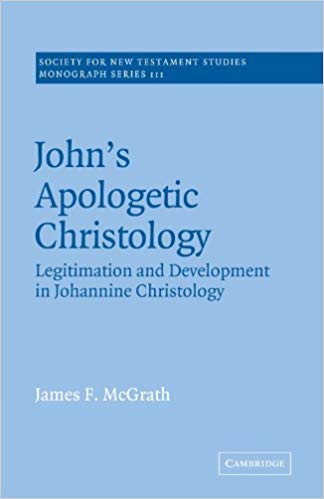Difference between revisions of "John's Apologetic Christology (2001 McGrath), book"
Saul Hankin (talk | contribs) |
|||
| (6 intermediate revisions by 2 users not shown) | |||
| Line 1: | Line 1: | ||
[[File:2001 McGrath.jpg|thumb|350px]] | |||
''' John's Apologetic Christology: Legitimation and Development in Johannine Christology''' (2001) is a book by [[James F. McGrath]]. | ''' John's Apologetic Christology: Legitimation and Development in Johannine Christology''' (2001) is a book by [[James F. McGrath]]. | ||
==Abstract== | ==Abstract== | ||
==Editions | "James McGrath offers a convincing explanation of how and why John arrived at a christological portrait of Jesus that is so different from that of other New Testament authors, and yet at the same time clearly has its roots in earlier tradition. McGrath suggests that as the author of the Fourth Gospel sought to defend his beliefs about Jesus against the objections brought by opponents, he developed and drew out further implications from the beliefs he inherited. The book studies this process using insights from the field of sociology."--Publisher description. | ||
==Editions== | |||
Published in Cambridge [England]: Cambridge University Press, 2001 ([[Society for New Testament Studies Monograph Series]], 111). | Published in Cambridge [England]: Cambridge University Press, 2001 ([[Society for New Testament Studies Monograph Series]], 111). | ||
== | ==Contents== | ||
*Part 1: Introduction | *Part 1: Introduction | ||
| Line 30: | Line 34: | ||
==External links== | ==External links== | ||
*[ Google Books] | *[http://books.google.com/books?id=TPsSfa2p_yYC&printsec=frontcover&dq=John%27s+Apologetic+Christology&ei=nyGfS-qkHIn2MfCa9KEH&cd=1#v=onepage&q=&f=false Google Books (partial text)] | ||
[[Category: | |||
[[Category: | |||
[[Category:English | [[Category:2001| McGrath]] | ||
[[Category: | |||
[[Category:English language--2000s|2001 McGrath]] | |||
[[Category:Johannine Studies--2000s|2001 McGrath]] | |||
[[Category:Johannine Studies--English|2001 McGrath]] | |||
[[Category:Apocalyptic Studies--2000s|2001 McGrath]] | |||
[[Category:Apocalyptic Studies--English|2001 McGrath]] | |||
[[Category:Historical Jesus Studies--2000s|2001 McGrath]] | |||
[[Category:Historical Jesus Studies--English|2001 McGrath]] | |||
[[Category:Christology (subject)|2001 McGrath]] | [[Category:Christology (subject)|2001 McGrath]] | ||
[[Category:John (subject)|2001 McGrath]] | [[Category:John's Christology (subject)|2001 McGrath]] | ||
[[Category:Gospel of John (text)|2001 McGrath]] | |||
Latest revision as of 20:47, 5 November 2019
John's Apologetic Christology: Legitimation and Development in Johannine Christology (2001) is a book by James F. McGrath.
Abstract
"James McGrath offers a convincing explanation of how and why John arrived at a christological portrait of Jesus that is so different from that of other New Testament authors, and yet at the same time clearly has its roots in earlier tradition. McGrath suggests that as the author of the Fourth Gospel sought to defend his beliefs about Jesus against the objections brought by opponents, he developed and drew out further implications from the beliefs he inherited. The book studies this process using insights from the field of sociology."--Publisher description.
Editions
Published in Cambridge [England]: Cambridge University Press, 2001 (Society for New Testament Studies Monograph Series, 111).
Contents
- Part 1: Introduction
- 1. Introduction: the development of Johannine Christology
- 2. A conflict setting and a distinctive Christology
- Part 2: Jesus and God
- 3. Are there 'two powers' in John?
- 4. God's Equal or God's Agent? (John 5)
- 5. 'I obey, therefore "I Am"' (John 8.12-59)
- 6. 'You are gods'-but who are 'you'? (John 10.22-39)
- 7. In the bosom of the Father (John 1.1-18)
- 8. Conclusion to part 2
- Part 3: Jesus, Moses, and Torah
- 9. The Word and the glory (John 1.1-18)
- 10. Descent and ascent (John 3.1-21)
- 11. Bread from heaven (John 6)
- 12. Legitimating sings (John 9)
- 13. Conclusion to part 3
- Part 4: Other Issues and Conclusion
- 14. Other possible issues
- 15. Putting the pieces together
- 16. Conclusion
